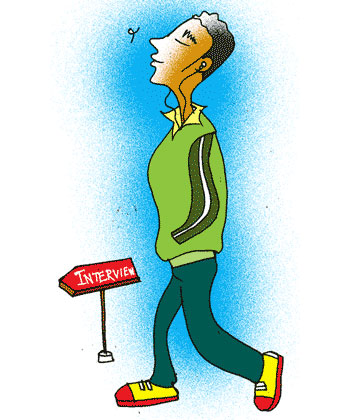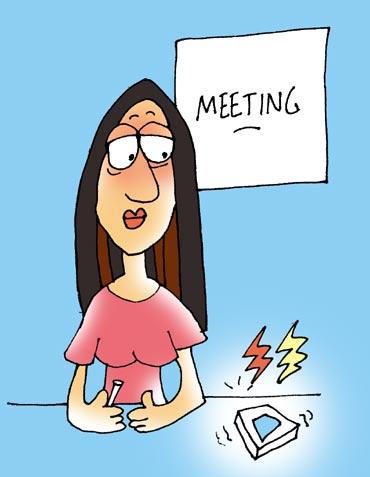
From the clothes you wear to how you explain the lack of work experience, the interviewer will be busy analysing everything you say or do -- to find out whether or not you're fit for the position you applied for.
So then, are you prepared to appear for your first job interview?
In the last several years of running a digital media and marketing company, I have had the wonderful opportunity to interview several youngsters.
Many of them were either fresh out of college or had up to a couple of years' work experience.
Very often, I was underwhelmed by the level of preparation and the attitude that these candidates brought to the interview.
I realised that these youngsters had not gotten either the right training or practice in appearing for job interviews, which in turn affected their prospects for employability.
I have listed a few tips for first timers, which I hope will benefit young prospective job hunters succeed in their interviews.
Read up on the company you are interviewing with
There have been occasions when candidates have shown up for an interview and aren't even sure of the name of the company they've applied to.
This happens mainly when the candidates are referred by an employment agency.
However, even when some candidates respond directly to an employment ad, many of them don't bother to check the company website or carefully look through the job requirements advertised.
Call this elementary preparation for an interview, but considering how often it gets overlooked, it is certainly worth reiterating.
Get a basic understanding of what the company does and what your role is likely to be before you land up for the interview.
Please click NEXT to continue reading...
The author is CEO of On Target Marketing Solutions, a Mumbai-based digital marketing agency.

It is likely that you have emphasised or underplayed some part of your CV to suit a particular job requirement.
Be aware of the customisation you have done in each particular case to ensure that you are not caught off-guard by any question.
It is also likely that the resume has been written or 'embellished' by a friend or colleague -- the least you can do in this scenario is to be familiar with what exactly has been written.
Please click NEXT to continue reading...
Illustration: Dominic Xavier/Rediff.com

Many interviewers may not even bother to look at these, but you are better off carrying a copy of your CV and relevant details of projects you've worked on with you.
I have had candidates come for interviews with nothing but their mobile phone in hand.
In such cases, you can be sure that the impression the interviewer forms of such a candidate won't be a favourable one.
Please click NEXT to continue reading...
Illustration: Dominic Xavier/Rediff.com

Punctuality says a lot about a person and the value one puts on one's own time as well as that of others.
Not being punctual for an interview can already set alarm bells ringing in the interviewer's mind about how the candidate will shape up at work.
Unless something absolutely unforeseen crops up, there is no excuse for someone to be late for an interview.
Traffic jams in a city like Mumbai are not exactly 'unforeseen' and so is the fact that trains are running late, so you are expected to factor in such eventualities into your travel time to arrive for the interview.
Now, if you do encounter one of those absolutely unforeseen circumstances that is going to set you behind schedule, have the basic courtesy to call up the HR manager or the person you will be interviewing with and apprise him of the situation.
Please click NEXT to continue reading...
Illustration: Uttam Ghosh/Rediff.com

The keyword here is 'appropriately'.
You may not need to dress up in a suit or tie for every interview, but you surely should dress smartly -- a well ironed shirt and trousers work for both men and women.
While some companies may entertain or ignore your weird dressing sense, most won't.
Find out about the dress code typically followed in the company and dress accordingly.
It won't also hurt to ask the HR manager or recruiter directly if there is a dress code to be followed for interviews (though I fully understand it may be a bit awkward to ask).
Please click NEXT to continue reading...
Illustration: Dominic Xavier/Rediff.com

For heaven's sake (and yours!), please turn off the mobile phone during the interview.
Some folks do keep it in silent or vibration mode, but then get distracted each time the phone rings.
I've also seen a couple of people say "Excuse me" in the middle of the interview and take the call!
A couple of missed calls may enhance your chances of landing the job.
Please click NEXT to continue reading...
Illustration: Uttam Ghosh/Rediff.com

Don't paint a picture of being all-knowing or claim experience in areas you don’t have.
There is no shame in admitting aspects that you don't know or haven't had adequate exposure to or experience with.
Experienced interviewers can easily determine the depth of knowledge and experience you have on a particular topic; so don't set yourself up for failure by making unrealistic claims.
Please click NEXT to continue reading...
Illustration: Dominic Xavier/Rediff.com

Many candidates go on rambling without really addressing the question asked.
When you do that, it tells the interviewer one of three things: a) you did not listen to the question properly b) you did not comprehend the question, or c) you don’t know the answer and you are trying to take the interviewer for a joy ride.
If you did not hear the question properly or did not understand the question properly, request the interviewer to repeat the question.
If you don't know the answer, say so instead of trying to lead the interviewer in another direction.
It's a tactic whose likelihood of success is rather low.
Please click NEXT to continue reading...
Illustration: Uttam Ghosh/Rediff.com

If you are interviewing with someone, it is obvious that you are exploring opportunities due to some discontentment with your current employer, be it in terms of remuneration, learning or growth opportunities, or office environment.
Whatever be the reason for your discontentment, present those without sounding bitter or too negative.
Training yourself to communicate in a positive manner is a great asset that will be respected and appreciated by any employer.
Please click NEXT to continue reading...
Illustration: Dominic Xavier/Rediff.com

Every interviewer will usually give you an opportunity to ask questions -- grab this opportunity with both hands.
Ask about the company, its plans, your role and responsibilities and career path before you ask about the likely compensation.
The questions you ask can tell the interviewer a lot about your personality traits, particularly your enthusiasm levels and interest in understanding the big picture.
By all means, ask questions about compensation and benefits and feel free to share your own expectations, but ensure that you discuss these after you have discussed your own job profile and the organisation's expectations from the same.
Illustration: Uttam Ghosh/Rediff.com